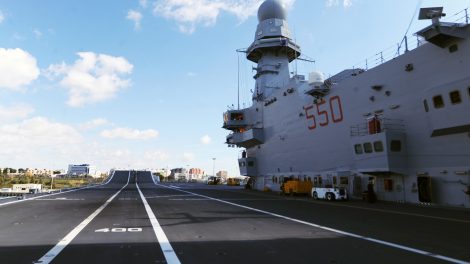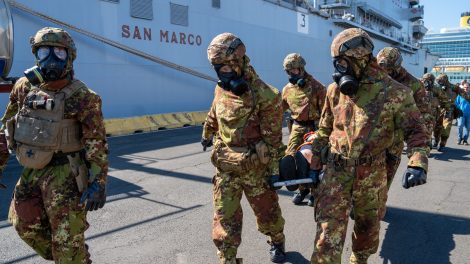The post-Vilnius rendez-vous. Italy’s Supreme Defence Council convened on Thursday, shortly after the NATO Summit’s end, to unpack the themes that had emerged in Vilnius and take stock of Italy’s own strategic challenges. The body, chaired by President Sergio Mattarella, brought Prime Minister Giorgia Meloni – who illustrated the Summit’s outcomes – together with the Chief of Defence Staff, Admiral Giuseppe Cavo Dragone, as well as the ministers of Foreign Affairs, Defence, Economy and Enterprise.
Focus on the Med. The ensuing note from the President’s Office, carrying the conclusions of the Council’s meeting, emphasised that Africa’s “political, social and economic consolidation” is required to “guarantee the security of the European Union’s member countries, which in turn are a fundamental part of the Atlantic Alliance.”
- The enlarged Mediterranean area remains an object of “special attention” in view of its strategic relevance and its potential as a crossroads of instability, capable of affecting several regions at the same time.
- PM Meloni – who has long been pushing NATO to focus on its Southern Flank – had called the Mediterranean Sea a “cone of interest” while in Vilnius. And the Alliance’s final communiqué vows to draw up a Southern Flank strategy in time for the 2024 Summit.
Italian forces around the world… The Supreme Defence Council’s talks also encompassed the various crisis areas where Italy’s Armed Forces operate. Since the outbreak of Russia’s war in Ukraine, the Italian military has been present in an arc stretching from the Baltic States to the Sahel, via the Balkans and the Middle East. The imponent display of force secures the country’s position in the increasingly complex and fragile global security scenario.
- In this regard, the Council further reiterated its support for Ukraine, based on Italy’s adherence to the values of freedom, territorial integrity and the independence of States, “founding values of the European Union and essential conditions for international order and the peaceful coexistence of peoples.”
… and their state. Such an intensive commitment requires an efficient and modern military instrument. For this reason, the Council discussed the need for a national industrial policy for the defence sector to ensure the Armed Forces’ “readiness and capability” by providing “adequate and sustainable levels of efficiency and deployment capacity over time.”
- Defence Minister Guido Crosetto outlined the principles that will guide the reorganisation of his ministry, which aims to make the organisation increasingly inter-force, capable of “operating in all domains, including new ones such as outer space, cognitive space and underwater” (in line with NATO requirements).




